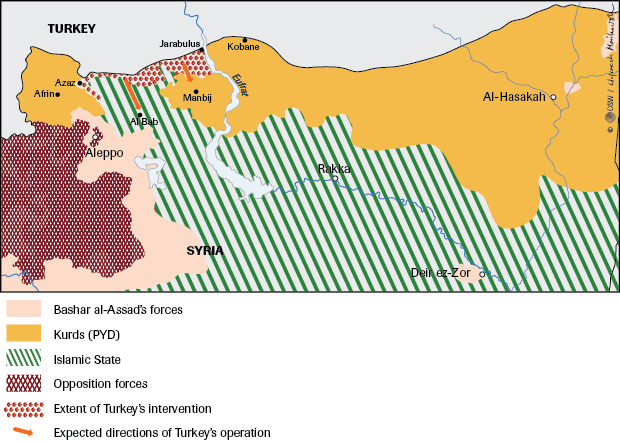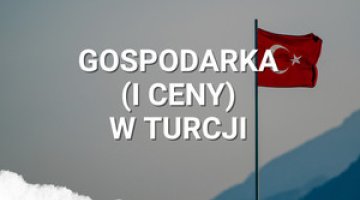Turkey is expanding its operation in Syria
On 19th September the Turkish President Recep Tayyip Erdogan announced the end of the first stage of the Turkish intervention in Syria (Operation Euphrates Shield) and the beginning of another one. The operation was launched on 24th August with Turkey capturing the border town of Jarabulus and then a strip of land approximately 100 kilometres long and ten to twenty kilometres wide. A relatively small number of Turkish troops are taking part in the operation - several hundred soldiers, supported by tanks, artillery and the air force, and certain units of the Free Syrian Army which constitute the main ground force in the intervention. The second stage of the operation announced by Erdogan will consist in expanding the zone controlled by the Turkish army and the Syrian forces supporting Turkey by a factor of five and in occupying new areas to the south.
Commentary
- The objectives of the first stage of Operation Euphrates Shield were to push Islamic State away from the Turkish border and to prevent the Kurdish Democratic Union Party (PYD) from connecting the territories it controls. Both objectives were achieved, which enables Turkey to move further south: above all to capture al-Bab, which is controlled by Islamic State, and to push eastwards and take over Manbij which was recaptured by the PYD at the beginning of August this year. The territorial expansion of the Turkish intervention will involve increasing the number of Turkish troops in Syria, which may cause an escalation in the fighting and result in a higher number of casualties among the Turks (so far there have been quite few Turkish casualties).
- At the first stage both the US and Russia supported Turkey’s military operation. For the US it was bringing benefits as the intervention was directly aimed at Islamic State and intended to deprive the organisation of its access to the Turkish border. For Moscow it is one of the elements of Russian-Turkish co-operation over the conflict in Syria which began following the normalisation of relations between the two countries. According to unofficial information, the zone between Azaz and Jarabulus in northern Syria may eventually function under joint Turkish and Russian control. Due to unrelenting tensions between Turkey and the US (caused by US support for the PYD) and closer co-operation between Ankara and Moscow (for instance a visit that the Russian Chief of the General Staff, General Gerasimov, paid to Turkey) it should be expected that Turkey will carry out its actions rather as part of bilateral collaboration with Russia than within an international US-led coalition.
- The expansion of the zone controlled by Ankara and its Syrian clients will largely impact both the development of the Syrian conflict and the rivalry of external actors over the conflict. The area captured following Turkey’s intervention lies at the contact point between territories which are controlled by all parties of the conflict. Turkey’s strategic goal appears to be the patronage of the Sunni forces in Syria through the elimination of Islamic State and to apply further pressure on the Kurdish forces. These actions may be compatible with Russia’s game over the political settlement of the Syrian conflict. Although Moscow does not seem interested in a permanent resolution to the conflict, it is actively using the question of ceasefires and peace talks to implement the broader goals of its foreign policy. Should Turkey gain the position of the main patron of the Sunni forces (which have thus far been fragmented) it would increase Russia’s room for manoeuvre in this regard.
MAP
Operation Euphrates Shield






